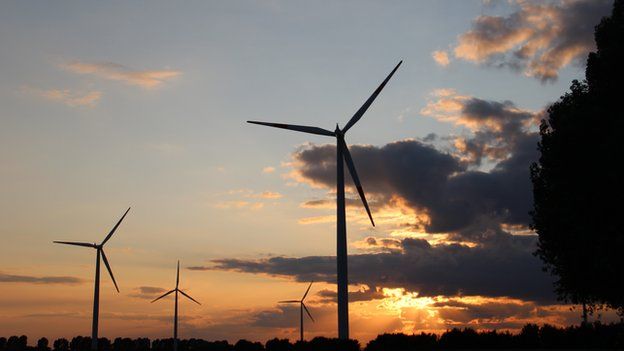'Messy compromise' expected on EU climate targets
- Published

EU leaders are meeting in Brussels to try and agree the Union's climate and energy targets for 2030.
A plan to cut CO2 by 40% from 1990 levels is on the table as well as new targets for renewables and energy efficiency.
There is significant opposition from Eastern Europe with Poland threatening to veto the measures.
However a compromise is expected with British officials "quietly confident" that a deal will be done.
Europe is seen as a global leader in cutting carbon - and the EU is committed to reducing CO2 by 80-95% by 2050.
But the 2030 targets are seen as an important signal to the rest of the world.
If they are accepted, they will boost the chances of a new UN deal on climate being agreed in Paris next year.
There are some significant hurdles to be overcome.
With 90% of their energy coming from coal, the proposal to cut 40% of carbon emissions is being vocally opposed by Poland.
The country's new Prime Minister Ewa Kopacz has made it clear she will use her veto if there is no compromise.
"This issue actually concerns all Poles, because everyone uses electricity," said Mrs Kopacz, speaking to reporters last week.
"That is why, if our conditions are not satisfied, I will have to make a radical move, even though this will be my first summit."
A leaked draft of the agreement suggests that Poland's concerns could be assuaged by a plan to give poorer countries 10% of the Emissions Trading Scheme (ETS) allowances.
These can then be sold to raise funds to help the transition to low carbon power production.
As a result, most analysts believe that the headline cut will go through.
"It seems certain that EU heads of state will agree on a target to reduce greenhouse gas emissions by 40%," said Brook Riley, from Friends of the Earth in Brussels.
"They will try and pass that off as ambitious but the fact is that it means a 50:50 chance of crossing the 2C temperature threshold."
Efficiency impact
However, finding agreement on renewables and energy efficiency is likely to prove more difficult.
The European Commission has proposed that a 30% target for energy savings and a 27% target for green power. There is also speculation the efficiency could also be reduced to 27%.
There are strong arguments about all these numbers. While a few percentage points either way might not seem like a big deal, according to research carried out for the Commission it could be hugely significant.
A 25% target on efficiency would reduce EU gas imports by just 9% - but increasing the target to 30% would see the same imports drop by over a fifth!
The UK is opposing any raising of the efficiency target. Friends of the Earth believes Mr Cameron's resolve is being stiffened by domestic concerns about UKIP.
"There's no getting away from the fact that Cameron is selling out efficiency and renewables targets to try and prevent a Farage backlash," said Brook Riley.
Countries including Portugal and Ireland are making arguments for special treatment. Portugal wants greater flexibility so it can export huge surpluses of renewables to other countries.
The Irish are asking that the country's ability to soak up extra carbon in bogland and forest should be taken into account when calculating emissions.
Denmark and a number of other countries are seeking to have emissions from transport included in the ETS. Some experts believe that with so many unused allowances in the scheme, such a move would have little impact.
"If these countries are serious about reducing transport emissions they should go for fuel efficiency standards," said William Todts from the campaign group, Transport & Environment.
"These are already reducing emissions from new cars by 40% between 2008 and 2021 - it's crazy to move to a system that doesn't really work."
Discussions in Brussels are likely to go into night, although some form of compromise is expected.
Observers argue that the significance of what will be agreed shouldn't be underestimated, whatever the drawbacks.
"We obviously need to do more to achieve the 2C target. This alone, is not going to get us there," said William Todts.
"Even if it is a messy compromise, it is better than what the Chinese and the Americans are doing."
Follow Matt on Twitter @mattmcgrathbbc.